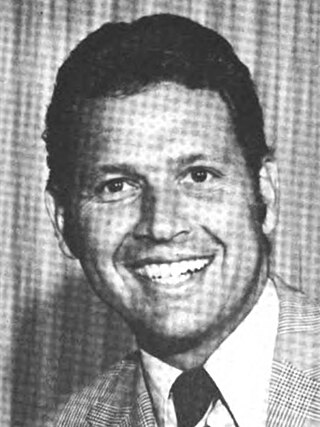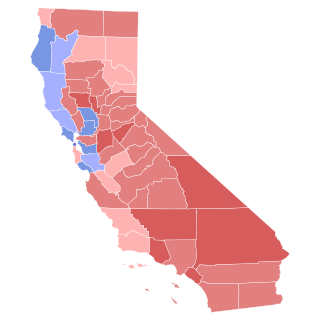| |||||||||||||||||
| |||||||||||||||||
 County results Younger: 40–50% 50–60% 60–70% Norris: 50–60% | |||||||||||||||||
| |||||||||||||||||
The 1974 California Attorney General election was held on November 5, 1974. Incumbent Republican Evelle J. Younger defeated Democratic nominee William Albert Norris with 55.00% of the vote.
| |||||||||||||||||
| |||||||||||||||||
 County results Younger: 40–50% 50–60% 60–70% Norris: 50–60% | |||||||||||||||||
| |||||||||||||||||
| Elections in California |
|---|
 |
The 1974 California Attorney General election was held on November 5, 1974. Incumbent Republican Evelle J. Younger defeated Democratic nominee William Albert Norris with 55.00% of the vote.
Primary elections were held on June 4, 1974. [1]
| Party | Candidate | Votes | % | |
|---|---|---|---|---|
| Democratic | William Albert Norris | 1,409,793 | 57.66 | |
| Democratic | Vincent Bugliosi | 1,035,179 | 42.34 | |
| Total votes | 2,444,972 | 100.00 | ||
| Party | Candidate | Votes | % | ±% | |
|---|---|---|---|---|---|
| Republican | Evelle J. Younger (incumbent) | 3,312,125 | 55.00% | ||
| Democratic | William Albert Norris | 2,707,998 | 44.97% | ||
| Majority | 604,127 | ||||
| Turnout | |||||
| Republican hold | Swing | ||||

The 1974 United States Senate elections were held on November 4, with the 34 seats of Class 3 contested in regular elections. They occurred in the wake of the Watergate scandal, Richard M. Nixon's resignation from the presidency, and Gerald Ford's subsequent pardon of Nixon. Economic issues, specifically inflation and stagnation, were also a factor that contributed to Republican losses. As an immediate result of the November 1974 elections, Democrats made a net gain of three seats from the Republicans, as they defeated Republican incumbents in Colorado and Kentucky and picked up open seats in Florida and Vermont, while Republicans won the open seat in Nevada. Following the elections, at the beginning of the 94th U.S. Congress, the Democratic caucus controlled 61 seats, and the Republican caucus controlled 38 seats.

The 1912–13 United States Senate elections were held on various dates in various states. They were the last U.S. Senate elections before the ratification of the Seventeenth Amendment in 1913, establishing direct elections for all Senate seats. Senators had been primarily chosen by state legislatures. Senators were elected over a wide range of time throughout 1912 and 1913, and a seat may have been filled months late or remained vacant due to legislative deadlock. Some states elected their senators directly even before passage of Seventeenth Amendment. Oregon pioneered direct election and experimented with different measures over several years until it succeeded in 1907. Soon after, Nebraska followed suit and laid the foundation for other states to adopt measures reflecting the people's will. By 1912, as many as 29 states elected senators either as nominees of their party's primary or in conjunction with a general election.

Evelle Jansen Younger was an American lawyer who served as the California Attorney General from 1971 to 1979. Prior to his career as Attorney General, he served as the district attorney in Los Angeles where he oversaw the prosecutions of both Charles Manson and Sirhan Sirhan. In 1978, he had an unsuccessful run as the Republican Party nominee for Governor of California and retired from politics a year later.

The 1978 California gubernatorial election occurred on November 7, 1978. The Democratic incumbent, Jerry Brown, defeated the Republican nominee Attorney General Evelle J. Younger and independent candidate Ed Clark in a landslide.

The 1958 California gubernatorial election was held on Tuesday November 4, Democratic candidate Pat Brown won the first of his two terms as governor of California against Republican senator William Knowland.

Kenneth Leon Maddy was a Republican member of the California State Assembly and State Senate from Fresno.

The 1932 United States presidential election in California took place on November 8, 1932 as part of the 1932 United States presidential election. State voters chose 22 representatives, or electors, to the Electoral College, who voted for president and vice president.

The 1874–75 United States Senate elections were held on various dates in various states. As these U.S. Senate elections were prior to the ratification of the Seventeenth Amendment in 1913, senators were chosen by state legislatures. Senators were elected over a wide range of time throughout 1874 and 1875, and a seat may have been filled months late or remained vacant due to legislative deadlock. In these elections, terms were up for the senators in Class 1.

The 1968 United States Senate election in Ohio took place on November 5, 1968. Incumbent Senator Frank Lausche ran for re-election to a third term, but lost the Democratic primary to former U.S. Representative John J. Gilligan. Before losing the primary to the more solidly liberal Gilligan, Lausche had one of the most conservative voting record among Senate Democrats, leaving the Democratic Party very disappointed. In the general election, Gilligan lost to Republican Ohio Attorney General William Saxbe in a very close race. Saxbe's victory increased the number of Senate Republicans in the 91st Congress. He would serve 5 years in the Senate before being nominated by President Richard Nixon to be U.S Attorney General, he resigned the seat after being confirmed. Gilligan, who in January 1974 was serving as the Governor of Ohio, named Saxbe's successor.

The 1970 Ohio gubernatorial election was held on November 3, 1970. Democratic nominee John J. Gilligan defeated Republican nominee Roger Cloud with 54.19% of the vote.

The 1964 Kansas gubernatorial election was held on November 3, 1964. Republican nominee William H. Avery defeated Democratic nominee Harry G. Wiles with 50.9% of the vote.

The 1976 New Hampshire gubernatorial election was held on November 2, 1976. Incumbent Republican Governor Meldrim Thomson Jr. defeated Democratic nominee Harry V. Spanos with 57.66% of the vote.

Elections were held in Illinois on Tuesday, November 5, 1940.

Elections were held in Illinois on Tuesday, November 3, 1936.

The 2018 United States attorney general elections were held on November 6, 2018, in 30 states, 2 territories, and the District of Columbia. The previous attorney general elections for this group of states took place in 2014, except in Vermont where attorneys general serve only two-year terms and elected their current attorney general in 2016.

The 1932 Wisconsin gubernatorial election was held on November 8, 1932. Incumbent Republican Governor Philip La Follette was defeated in the Republican primary, and in the midst of the Great Depression and nationwide voter dissatisfaction with the Republican Party, Democratic nominee Albert G. Schmedeman defeated Republican nominee Walter J. Kohler Sr. and Socialist nominee Frank Metcalfe with 52.48% of the vote. Schmedeman became the first Democrat to win a gubernatorial election in Wisconsin since George Wilbur Peck in 1892. 2 years later, in 1934, La Follette would run for governor again and defeated Schmedeman, this time running with the Progressive Party.

The 1962 California lieutenant gubernatorial election was held on November 6, 1962. Democratic incumbent Glenn M. Anderson narrowly defeated Republican nominee George Christopher with 51.42% of the vote.

The 1990 California Attorney General election was held on November 6, 1990. Republican nominee Dan Lungren narrowly defeated Democratic nominee Arlo Smith with 46.77% of the vote.

The 1978 California Attorney General election was held on November 7, 1978. Republican nominee George Deukmejian defeated Democratic nominee Yvonne Brathwaite Burke with 52.88% of the vote.

The 1970 California Attorney General election was held on November 3, 1970. Republican nominee Evelle J. Younger defeated Democratic nominee Charles A. O'Brien with 49.28% of the vote.